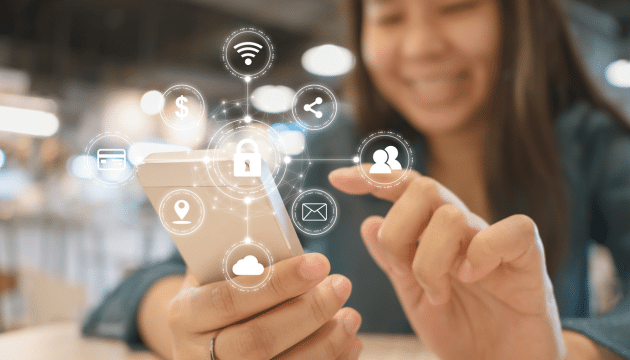Your cell phone is your trusted companion, your admin assistant, social director, banker, compass, and connection to the world. If it ends up in the wrong hands, you could be in deep trouble.
At best, a hacked phone could make life difficult. At worst, it could result in thousands of dollars in identity theft. Here’s what you need to know to protect your cell phone from hackers.
Update to the latest version.
Many hackers take advantage of out-of-date operating systems. Whether you have iOS or Android, make sure to update your phone to the newest version. This will give you the latest security fixes.
Avoid fingerprint and facial recognition.
Hackers can take your fingerprints from a drinking glass to open your phone. They also can use photos of you to get past facial recognition settings. Use a pin instead and make sure you’re the only one that knows it. Change it regularly, at least once a year.
Pro Tip: Don’t set your phone to automatically unlock, even at home. If you’re an iOS user, disable Siri access from the lock screen.
Avoid unsecured connections.
Public WiFi is available nearly everywhere. While it makes our lives easier, it comes with security risks. Use caution if you’re on an unsecured network. Never access your bank account or shop online unless you’re on a secure network with a lock icon.
Pro Tip: Use a VPN, a virtual private network that protects your identity while working on a public network. VPNs usually have an associated fee.
Use strong passwords for your apps.
Avoid pet names, birthdays, and other personal information that may readily be available on social media. It makes it easy for hackers to guess your password. The best passwords are complex and unique. Password managers make it easy to set distinct passwords without having to memorize them.
Pro Tip: For an added layer of security, use different email addresses: one for financials and one for social media.
Don’t just download any apps.
Anyone can create an app, including hackers. If you download the wrong app, you could be adding malware that can steal from your phone. Make sure the apps you’re using are from reputable companies. Take a few minutes to review your apps and delete any that aren’t verified.
Don’t save your information.
It may be convenient to save your credit card information on online shopping sites. Check out as a guest instead. Be selective when you give out your personal information.
Freeze your credit.
Cell phone providers use the National Consumer Telecom & Utilities Exchange. Freeze your credit with them and with the big 3 credit unions: TransUnion, Equifax, and Experian. This will ensure that no one can open new accounts in your name.
Disable WiFi, Bluetooth and Cellular Data if not using your phone.
A hacker can’t hack you if you’re not connected. When in a public place, you can disable access to the internet. One easy way is to turn on Airplane Mode. You also can use your user’s manual to find out how to disable connectivity.
Consider anti-virus software.
There are two schools of thought on whether security software is necessary for smartphones. Some say it’s unnecessary and others recommend it. You may consider it as an additional layer of protection.
Know how to control your phone remotely.
Settings and apps allow you to remotely lock and erase your phone if it’s stolen. Make sure you know how to use them. There is the “Find My Phone” option in iCloud and the Android Device Manager in Google.
Back up your data.
Make sure you regularly back up your data to the cloud or your computer. If you’re hacked, you’ll still have access to that information.
How to Know if Your Phone Has Been Hacked
You may not realize the moment your phone is hacked. Initially, it may present as a technical issue. Malware can cause this with its malicious code. Watch for these telltale signs:
- Your phone loses charge quickly.
- Your phone runs very slowly, freezes and crashes.
- You notice unusual activity on your online accounts.
- There are popups or changes to your home screen.
- You receive unfamiliar calls or texts.
If you believe your phone was hacked, install and run anti-virus protection. Delete any risky apps, texts, and files. If the damage is extensive, you can always wipe and restore your phone to factory settings. Then you’ll be able to address the damage done by hackers to your accounts, both financial and social.
This article is furnished by California Casualty, providing auto and home insurance to educators, law enforcement officers, firefighters, and nurses. Get a quote at 1.866.704.8614 or www.calcas.com.
- California Casualty Earns Financial Stability Rating® of A, Exceptional, From Demotech, Inc. - April 28, 2025
- Music & Arts Grant Recipients – 2024 - December 13, 2024
- Understanding Auto and Home Insurance Rate Changes - December 3, 2024

